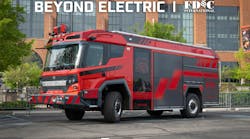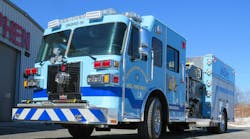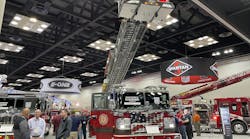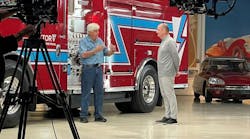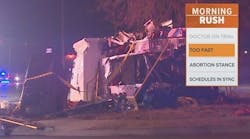Some insurance companies offer replacement cost value as an option to actual cash value, when insuring fire apparatus and EMS vehicles. For more information on actual cash value apparatus insurance refer to Emergency Vehicle Operations in Firehouse®, January 1999. One problem associated with replacement cost value is that there is no standard definition among insurance companies. For this column we will use the following definition, which is fairly close to what several of the big insurance companies use:
Replacement cost value is the LESSER of:
- The cost to repair the damaged vehicle;
- The cost to replace the damaged vehicle with another vehicle of like kind and quality; or
- The amount you actually spend to repair or replace the damaged vehicle.
Immediately, you can see that replacement cost value eliminates one of the biggest hassles of actual cash value: depreciation. Because replacement cost value does not mention depreciation, you don't have to argue with the insurance company about how many years of useful life are left in the vehicle. With replacement cost value, the insurance company does not care how old the vehicle is. All the company needs to know is, "What it is going to cost to repair or replace the vehicle?" Replacement cost value has a number of problems, though, and you will need to understand these problems before we can look at solutions.
The first problem with replacement cost value insurance is that, just like actual cash value insurance, you are going to have arguments with the insurance adjuster about repairs. The adjuster will want to make the repairs as cheaply as possible while your department will want everything done first class. The adjuster may want to use aftermarket parts or used (salvage yard) parts, while you will want only new parts. The adjuster wants to use touch-up paint on the scratches; your department wants the entire panel repainted. These will be difficult arguments for your department to win.
Technically, using touch-up paint or aftermarket parts satisfies the legal definition of "repair the damage." The policy will not require the repairs to be made to your department's satisfaction. The insurance company is obligated to its investors to spend the least amount of money as possible on your claim. Of course, you have the option of rejecting the insurance company's recommended repairs and getting the repairs done the way you want. But the insurance company must pay your department only what the cheapest repairs would have cost at the cheapest shop; your department must pay for anything over that amount.
To avoid arguments over repairs (and to attract more customers), some insurance companies have tried to improve the "repairs" clause in their definitions of replacement cost value. For instance, one fire department that I know has an insurance policy that says repairs will be based on "the amount needed to repair the lost or damaged parts using NEW parts identical to the lost or damaged parts without deduction for depreciation." Another policy that I have read will pay "the cost to replace a part or parts of the damaged vehicle at the time of the loss with a part or parts of like kind and quality, without deduction for depreciation." While neither of these definitions is perfect, they are an improvement over the standard wording, "the cost to repair the damaged vehicle." Please read your policy carefully to see what it says about repairs. For that matter, read your whole policy and make sure that your department is covered for all those calamities that you believe it should be insured against.
The next problem: Many fire chiefs think that "replacement cost" means that if the department destroys its truck in an accident, it will get a new truck. It doesn't. This misunderstanding comes from insurance for buildings where, if a fire destroys your fire station and it was insured on a replacement cost basis, then you get a new fire station.
The problem with vehicles is the words "like kind and quality." What does this mean? What it means is that if you total a 1985 2,000-gpm pumper that had 3,500 hours on it, the insurance company can go shopping in the used vehicle market for a comparable 2,000-gpm pumper to replace it with. It doesn't have to buy you a new one!
Take another look at the definition of replacement cost value - notice that the insurance company pays only the LESSER of the cost to repair the damaged vehicle or the cost to replace the damaged vehicle with another vehicle of like kind and quality or the amount you actually spent to repair or replace the damaged vehicle. This means that until you actually spend money to make the repairs, the insurance company does not owe anybody anything.
Please understand that most insurance companies are NOT going to make you pay for the repairs before they will reimburse you. Usually, they will pay the shop directly when the repairs are finished or, on a big job, with progressive payments to the shop. But, if they want to play hardball, they could make you pay for the repairs, then ask the insurance company for reimbursement. Most state insurance laws give the insurance companies up to 30 days to settle. The lesson here is to be sure you deal with a reputable company, preferably one recommended to you by another fire department that already has gone through a big claim with the company and had no trouble.
Another problem is that if your department has a shop and makes its own repairs, you will still be paid only the amount you spend. In other words, the insurance company does not have to pay for your labor if you make the repairs yourself unless you can demonstrate that your labor costs were higher than they would have been if an outside shop had been used.
Let's say a truck repair would normally cost $20,000, but you can do it for $10,000 using your mechanics. The insurance company has to pay only what you actually spend on the repairs. So if you make the repairs yourself, it has to pay only $10,000. In the real world, if your department is in this situation, you can probably negotiate for more (because you are saving the insurance company money), but legally you may have to choose between the $10,000 or having the work done at a commercial shop.
Here is one more thing to consider about replacement cost value. Let's say your tanker truck is badly damaged in an accident. It's going to take nine months to repair. Chances are, you may not want to fix it. You may want the insurance company to buy your department a new vehicle.
But replacement cost value insurance does not work that way. The insurance company always has the option of repairing the damage if it can get the job done for less than the cost of a comparable vehicle.
Does all this mean that replacement cost value is a bad choice? If you insure with a top-notch carrier that you trust, if you have a good understanding of how repairs will be made and if your fleet is relatively young, replacement cost value may be for you. But most departments find that there are too many problems and pitfalls with replacement cost value. As a result, the insurance carriers have developed a better type of replacement value insurance. Next month, we will look at "improved" replacement cost value insurance, which is usually sold with terms such as "agreed amount," "agreed value" or "stated value."
Michael Wilbur, a Firehouse® contributing editor, is an FDNY lieutenant in Ladder Company 27 in the Bronx and a firefighter in the Howells, NY, Fire Department. He is an adjunct instructor at the New York State Academy of Fire Science and the Orange County Fire Training Center. Wilbur has developed and presented emergency vehicle operator courses throughout the country and has consulted on a variety of fire apparatus issues.
